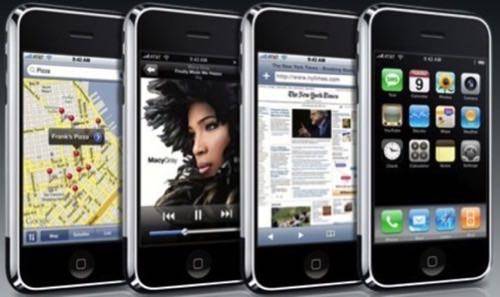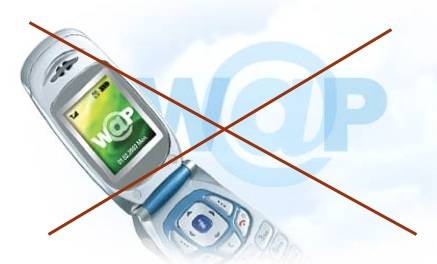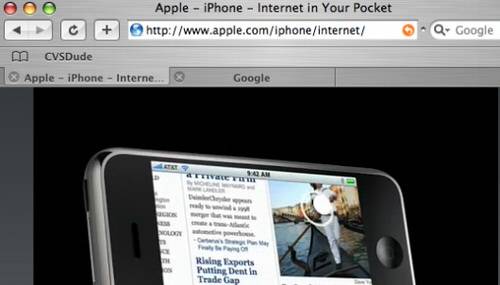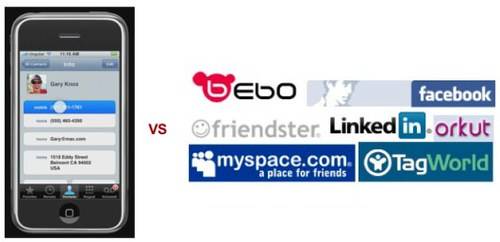iPhone is more than just a breakthrough mobile phone device. It is a strategy that
may expand Apple’s sphere of influence, from web browsing to social networking and even
possibly search.

The iPhone is here. The blogosphere is echoing with both great praise and cries of
problems. The hype was both met and a bit too much. Overall, it seems that both media and
users are underwhelmed with the iPhone as the phone. And people are not overly excited
about yet another iPod, because we’ve had plenty of those over the last few years. Yet,
iPhone is important and possibly game changing – because it could be the first mobile
device to truly bring a rich web experience to a mobile device. With iPhone and the
latest release of Safari for Windows, Apple has openly jumped into the browser wars. And
finally, and perhaps most importantly, iPhone could be Apple’s foray into the world of
social networking. Let’s take a deeper look along each of these axes.
Is iPhone a WAP killer?
Until iPhone showed up on the scene, the web experience on Mobile devices was
drastically different compared to PC access. For mobile, Web Sites and Services reduced
the amount of the information on each page and displayed it using Wireless Application
Protocol (WAP) and Wireless Markup Language (WML). Even the Blackberry, known for its
exceptional innovation in the wireless space, had to do a lot of heavy lifting to squeeze
the Web into a small screen.
The worst part about the WAP solution was that each web site needed to present its
results using a different format, if it wanted to be browseable from a wireless device.
Doing double work for content owners is both time-consuming and error prone, so only
large companies invested in doing this. Which means that the long tail of the Internet
was, for the most part, inaccessible from wireless devices.

Apple took an entirely different approach and focused on making web sites work on the
iPhone, as is. Since iPhone runs OS X Safari, for designers it is only a matter of
figuring out how to make web pages fit onto a small screen. Naturally, there are already
several technologies that exist to help people browse when the content does not fit onto
a screen – scrolling, paging and zooming. So Apple combined its innovative multi-touch
technology with some old ideas, to deliver a complete browsing experience to the iPhone
users. How well it will work remains to be seen. Particularly, will people be able to
master multi-touch and will they like the experience of looking at pieces of a web page?
If the answer is yes, then the iPhone will break the Web out of the WAP prison.
Can Safari Succeed in the Browser Wars?
Apple carefully aligned the launch of iPhone with the launch of Safari on Windows.
There is no way this is a coincidence. Why does Apple want to jump into the browser wars?
The answer is that anybody who has a shot wants to be part of this war; and with the
iPhone, Apple actually does have a shot.

The current state of browsers is in a flux. Microsoft’s Internet Explorer is receding,
but not as quickly as some thought. Firefox is gaining, but again not as quickly. Apple
sees an opportunity – because neither opponent is playing the perfect game. If iPhone
becomes popular, Apple possibly has a decent chance of success in the browser wars,
because people like to use the same application everywhere. Today’s Safari is a no bells
and whistles, quick and robust web browser. It has less features than Firefox, but it
also has a lot of die hard fans in the Mac community.
You can get more details about the current state of the browser war battlefield from
our reviews. We profiled Firefox 2.0 and Internet
Explorer 7.0 when both came out. We also wrote two posts about the browser wars: Web Browser
Faceoff and Why
Browser Wars Will Heat up in 2007. The first post hit a nerve with Safari fans,
because we described it as less modern than other browsers. The second post was focused
on the economics of the war; and is very applicable to Apple’s jump into this market.
Winning the browser wars equals winning control over Web eyeballs and the
precious search box. Apple knows this very well and is likely to have more tricks up its
sleeve, like a new version of Safari.
Can iPhone jumpstart Apple in Social Networking?
Apple has not been very active in the social networking space so far. Sure it is a
consumer electronics company, but still – a social network would be very complementary.
Well, with iPhone hitting the streets, Apple might have pulled itself into this lucrative
market with the speed of light. What better social network can you wish for than a phone
book? Family, friends and business contacts all end up in our phones. Apple is very
likely to tap into this huge network of subscribers. Because we take our mobile phones
with us everywhere – and certainly this will be the case with the feature-packed iPhone –
Apple has a chance at pulling off some serious upsets in the social networking space.

The fact that Apple is going to have control of the native iPhone applications for
phone and chat will give it big leverage. As people interact with each other, the
software can learn a lot about user behavior and build a social system that leverages
this behavior. A simple example is a filter that is currently missing in Facebook.
Currently in Facebook all updates from my contacts are treated equally. Anytime anyone
does anything, I get informed. This is already annoying to many users. With the iPhone,
Apple can quickly gather data about how much interaction we have with each other – and so
build a heuristic for filtering information based on that.
Conclusion
iPhone is more than just a breakthrough mobile phone device. It is a strategy that may
expand Apple’s sphere of influence, from web browsing to social networking and even
possibly search. If iPhone users embrace the multi-touch interface for browsing the web,
then WAP will become obsolete. If Safari on iPhone and Windows manages to win peoples
hearts, then Apple might gain a position in the browser market – perhaps as strong as
Firefox. Incidentally, for now this plays in Google’s favor, as Google is friendly with
both Firefox and Apple. And if Apple starts building a social network around the iPhone,
then MySpace and Facebook will have to start paying attention.
All of these things are of course ‘big ifs’. But we have no reason to doubt either the
seriousness or ability of Apple. Since Steve’s job return in 1997, the company has not
disappointed. So are all and any of these possible? Definitively – and very likely too.
Apple is playing this game to win and to win big. Lets see what happens next and in the
mean time, please share your thoughts on what part iPhone will play in Apple’s business
strategy.









